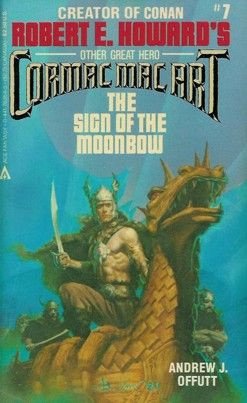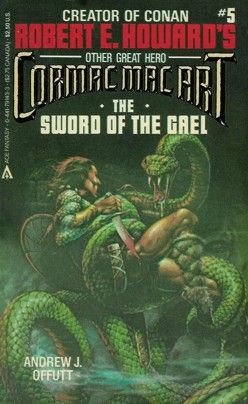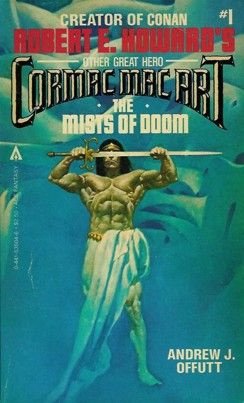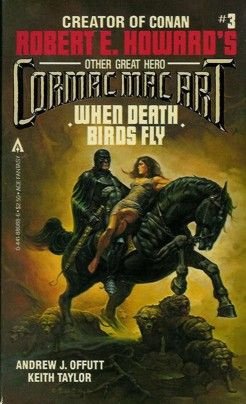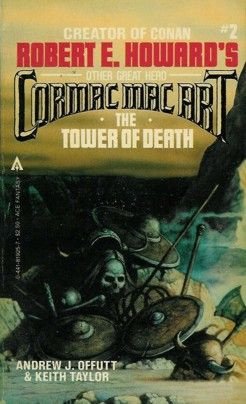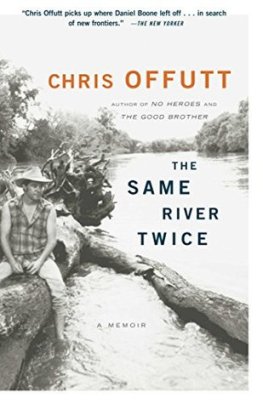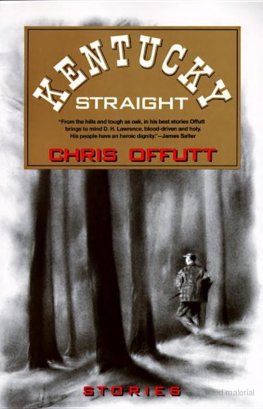Andrew Offutt - The Sign of the Moonbow
Here you can read online Andrew Offutt - The Sign of the Moonbow full text of the book (entire story) in english for free. Download pdf and epub, get meaning, cover and reviews about this ebook. genre: Romance novel. Description of the work, (preface) as well as reviews are available. Best literature library LitArk.com created for fans of good reading and offers a wide selection of genres:
Romance novel
Science fiction
Adventure
Detective
Science
History
Home and family
Prose
Art
Politics
Computer
Non-fiction
Religion
Business
Children
Humor
Choose a favorite category and find really read worthwhile books. Enjoy immersion in the world of imagination, feel the emotions of the characters or learn something new for yourself, make an fascinating discovery.
- Book:The Sign of the Moonbow
- Author:
- Genre:
- Rating:5 / 5
- Favourites:Add to favourites
- Your mark:
- 100
- 1
- 2
- 3
- 4
- 5
The Sign of the Moonbow: summary, description and annotation
We offer to read an annotation, description, summary or preface (depends on what the author of the book "The Sign of the Moonbow" wrote himself). If you haven't found the necessary information about the book — write in the comments, we will try to find it.
The Sign of the Moonbow — read online for free the complete book (whole text) full work
Below is the text of the book, divided by pages. System saving the place of the last page read, allows you to conveniently read the book "The Sign of the Moonbow" online for free, without having to search again every time where you left off. Put a bookmark, and you can go to the page where you finished reading at any time.
Font size:
Interval:
Bookmark:
Andrew J. Offutt
The Sign of the Moonbow
Prolog
A cadaverously thin man stood close against the ships mast, his back to it. His robe flapped in the breeze that drove the one-sailed craft across the sea that lapped south and east of Britain. Night-dark was that robe; tall was its wearer. He was bound in place, though not with ropes. Cords could not hold such a one able to assume slithering forms other than his own. Nor could he be prisoned with leather, or with chains of iron or steel.
Two sword pommels stood out from his chest and abdomen. He was held fast in the only way he could be held: impaled and pinned to the mast, motionless and unmovable. The swords nailed him to the mast.
No blood flowed.
He writhed, snarling.
It was not from lips those snarls emerged, for the doubly impaled man had no lips. Nor mouth, nor face he had; there was neither cartilage nor skin nor hair on the shining, grey-white skull that was his head. Yet within the shadowed holes that had been eye sockets, red lights burned, more like hellish and ever-maleficent flames than eyes. He writhed, and snarling sounds emerged from his lipless mouth.
He saw; he felt; he complained of cold, but not of pain.
He was neither alive nor dead. Dead, he lived. Yet he could not be slain, for he was not truly alive. Un-dead he had been for eighteen thousand years, escaping all the means that had slain so many others, the countless deaths he had personally wrought and callously caused. He could only be held-and only by this ghastly means.
The skewered man in the dark robe rode the foremost of two ships that slid over little known seas.
Each could loft a single sail, though the gentle breeze filled only the sail of the first. Each was constructed of overlapping planking in the clinker style. Each could ship over thirty oars, though neither did. Neither had as many as twenty aboard to man her oars, nor even ten. Many men lay dead in their dual wake, all victims of the power and machinations of the baneful captive with the skull for a face.
The second ship was without crew at all. All those who had sailed her hence down from Britain were dead; all she had borne out to sea now provided food for the plants and creatures on its floor. Unmanned, bearing the name Amber Rowan along her bluepainted side, she wallowed along at the end of thick plaited cables of rope, doubled and tripled. Her greyed sail was furled against a sudden change in the light breeze, whether of direction or force.
The towing ship was heavy laden, though it bore six persons-and one of those was the repugnant creature nailed to her mast. Not for so few was the using of oars. Green-streaked Quester was no merchant vessel, but bore considerable cargo.
The fine fabrics and the gold, the silver and jewellery of precious stones, the arms and armour and wrapped personal possessions of some twenty men were not trade goods.
All had been stolen-if aught could be called stolen that had been paid for in the scarlet coin of so many lives. The cargo had been the booty of murdering Norse reavers, all four months dead; it had been sought by three-and-twenty Britons, all dead over a fortnight. The cargo had been taken from the Norse pirates cache, and that on a tiny isle where stood a castle raised by men dead these hundred and eighty centuries.
The undead man was of long-sunken Atlantis. The survivors and possessors of the rich plunder, his captors, were four of the Eirrin-born and one of the land they called Loch-linn, home of the Danes, Dane-mark.
The Dane was a giant, red of hair and bushy unkempt beard, huge of chest and broad of shoulder. His arms were the size of the thighs of other men. He lounged at the tiller, his ax, shield, and coat of scale-mail nearby. Little effort was required of him. The sun was bright, the breeze steady and not swift, the ship slowed by the similar long boat she towed. When the sun was lower, he would use the sun-stick to check their course. By day, there was no other means.
One man was speaking. Like the fell writhing captive he was robed, though in the green of nature, and girt with a length of rope. A lunula hung on his chest, a half-moon of gold that returned the suns light in dull flashes. Above, mote closely fitting, he wore the twisted necklet of the Celts, a torc. He it was who had promised fair skies and good winds. His companions had learned to believe this servant of Behl and Crom, and to believe.
In times more ancient than we count, the green-robed druid told the others, an exile from Atlantis found employment as weapon-man in a land called Valusia. Time came when he made challenge to the king, and brought defeat and death on him, and the Atlantean was king over Valusia. His name was Kull. Trusted counsellor to him was a man named Tu. Just that: Tu. I am I was Tu, as I have been others since, in the endless cycle of birth and death and rebirth. And you, Cormac, who have been others as well, are and were Kull. For it is all the same, Celt and Keltoi and the Keltii of the Romans; Kull and Cormac, Cull and Kormak.
The others looked at the man the druid addressed as Cormac.
Dark of hair and skin he was, like the druid, and with the same grey eyes though the druids held more blue; both men were Gaels, of Eirrin. A life fraught with hacking swords and venomously whining arrows and rushing battle axes had left scars that, with his narrowed deepset eyes, imparted a rather sinister aspect to the face of the man called Cormac. Yet he was loved by four of the six aboard, including the woman, and hated by one-the captive.
I remember, Cormac said.
The Dane frowned, giving ear in silence. Their talk was alien to that which he had been taught, but others among the beliefs hed held true had been shaken in this company, more than once. Father Odin will I not dine and drink with you, but return once more in another body to live another life on this same Midgard? The redbeard looked not happy; one-eyed Allfather Odin made no reply.
A great enemy and plotter against King Kull, the druid said who had been Tu of Valusia, was the mage and master of illusion, Thulsa Doom. In no less than four plots did Kull foil the wizard and put defeat on him, though in each wise Thulsa Doom prevailed for a time. On two occasions did the king like to lose his life to this unrelenting enemy. And eventually Kull and Tu and a mage on Kulls behalf won the final victory-on the isle where were just after being.
The others glanced back. But the isle of sorcery-wrought dread and evil, that isle of Kulls sorcerously preserved castle, was long since left behind and lost to sight. Hours ago they had consigned to the sea the comrades they had lost to death there, of the power and plottings of their captive and the iresome illusions he created.
There Thulsa Doom was-left, the druid said, trapped by sorcerous bonds: the bondage of a body without hands or feet or voice.
The serpent Cormac slew! the Dane rumbled. Four months agone that was, when he and I rescued Samaire from the Norsemen.
Redbearded Dane looked at the red-maned woman he called Samaire. She was in her second decade of life and wore strange tall boots of black leather that rose up her thighs to vanish under her folded tunic. Her long hair gleamed orange and gold in the sunlight.
And the vanishing? she asked, this Samaire. Those several times Thulsa Doom vanished, Bas, whilst we laboured to load our ships, and his disappearing even when impaled?
And returned, still impaled, the youngest aboard said, and he glanced at the undying wizard. The youth sat on a rowing bench, near Cormac. His hair was very fair.
Of old, Bas the Druid made reply, Thulsa Doom effected escape into another dimension, a sort of world parallel to ours and not unlike it-and yet
Font size:
Interval:
Bookmark:
Similar books «The Sign of the Moonbow»
Look at similar books to The Sign of the Moonbow. We have selected literature similar in name and meaning in the hope of providing readers with more options to find new, interesting, not yet read works.
Discussion, reviews of the book The Sign of the Moonbow and just readers' own opinions. Leave your comments, write what you think about the work, its meaning or the main characters. Specify what exactly you liked and what you didn't like, and why you think so.

